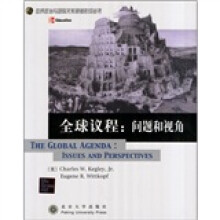全球议程:问题和视角

PART ONE ARMS AND INFLUENCE
1 Power, Capability, and Influence in International Politics—K. J. Holsti
2 Power and Interdependence in the Information Age—Robert O. Keohane and Joseph S. Nye, Jr.
3 The Role of Military Power in the Third Millennium—Bjorn Moller
4 War and Its Causes—Jack S. Levy
5 The Obsolescence of Major War—John Mueller
6 Nuclear Weapons Threaten Our Existence—Paul H. Nitze
7 The New Threat of Mass Destruction—Richard K. Betts
8 Terrors New Face: The Radicalization and Escalation of Modern Terrorism—Walter Laqueur
9 The Trouble with Sanctions—Robert A. Sirico
10 The Changing Nature of World Power—Joseph S. Nye, Jr.
PART TWO DISCORD AND COLLABORATION
11 Models of International Relations: Realist and Neoliberal Perspectives on Conflict and Cooperation—O/e R. Holsti
12 Managing the Challenge of Globalization and Institutionalizing Cooperation Through Global Governance—David Held and Anthony McGrew, with David Goldblatt and Jonathan Perraton
13 What to Do with American Primacy—Richard N. Haass
14 Building Peace in Pieces: The Promise of European Unity—Donald J. Puchala
15 Managing Conflict in Ethnically Divided Societies: A New Regime Emerges—Ted Robert Gurr
16 The New Interventionism and the Third World—Richard Falk
17 The Coming Clash of Civilizations: Or, the West Against the Rest—Samuel P. Huntington
18 Human Rights: From Low to High Politics in International Relations—David P. Forsythe
19 The Institutional Maintenance of Twenty-First Century World Order—Harvey Starr
20 How Democracy, Interdependence, and International Organizations Create a System for Peace—Bruce Russett
21 The Reality and Relevance of International Law in the Twenty-First Century—Christopher C. Joyner
PART THREE POLITICS AND MARKETS
22 Three Ideologies of Political Economy—Robert Gilpin
23 Whose "Model" Failed? Implications of the Asian Economic Crisis—Linda Y.C. Lim
24 The World Is Ten Years Old: The New Era of Globalization—Thomas L. Friedman
25 Workers of the World, Now What?—Kathleen New/and
26 Competitiveness: A Dangerous Obsession—Paul Kmgman
27 Dollarization: More Straight Jacket than Salvation—Jeffrey Sachs and Felipe Larrain
28 Global Rules for Global Finance—Ethan P. Kapsteln
29 The WTO and Nonmarket Economies—Greg Mastel
30 The Brave New Wired World—Daniel F. Burton, Jr.
31 Life Is Unfair: Inequality in the World—Nancy Birdsall
PART FOUR ECOLOGY AND POLITICS
32 Entering the Twenty-First Century—John L. Petersen
33 Ecological Myths: One Planet, One Experiment—Paul R. Ehrlich and Anne H. Ehrlich
34 Do We Consume Too Much?—Mark Sagoff
35 Dietary Implications of the Globalization of the Food Trade—Tim Lang
36 Encroaching Plagues: The Return of Infectious Disease—Laurie Garrett
37 Climate Change: Can The North and South Get in Step?—Seth Dunn
38 The Next Doubling: Understanding Global Population Growth—Jennifer D. Mitchell
39 Gray Dawn: The Global Aging Crisis—Peter G. Peterson
40 Environment, Scarcity, and Violence—Thomas Homer-Dixon
41 The Tragedy of the Commons in Global Perspective—Marvin S. Soroos
1 Power, Capability, and Influence in International Politics—K. J. Holsti
2 Power and Interdependence in the Information Age—Robert O. Keohane and Joseph S. Nye, Jr.
3 The Role of Military Power in the Third Millennium—Bjorn Moller
4 War and Its Causes—Jack S. Levy
5 The Obsolescence of Major War—John Mueller
6 Nuclear Weapons Threaten Our Existence—Paul H. Nitze
7 The New Threat of Mass Destruction—Richard K. Betts
8 Terrors New Face: The Radicalization and Escalation of Modern Terrorism—Walter Laqueur
9 The Trouble with Sanctions—Robert A. Sirico
10 The Changing Nature of World Power—Joseph S. Nye, Jr.
PART TWO DISCORD AND COLLABORATION
11 Models of International Relations: Realist and Neoliberal Perspectives on Conflict and Cooperation—O/e R. Holsti
12 Managing the Challenge of Globalization and Institutionalizing Cooperation Through Global Governance—David Held and Anthony McGrew, with David Goldblatt and Jonathan Perraton
13 What to Do with American Primacy—Richard N. Haass
14 Building Peace in Pieces: The Promise of European Unity—Donald J. Puchala
15 Managing Conflict in Ethnically Divided Societies: A New Regime Emerges—Ted Robert Gurr
16 The New Interventionism and the Third World—Richard Falk
17 The Coming Clash of Civilizations: Or, the West Against the Rest—Samuel P. Huntington
18 Human Rights: From Low to High Politics in International Relations—David P. Forsythe
19 The Institutional Maintenance of Twenty-First Century World Order—Harvey Starr
20 How Democracy, Interdependence, and International Organizations Create a System for Peace—Bruce Russett
21 The Reality and Relevance of International Law in the Twenty-First Century—Christopher C. Joyner
PART THREE POLITICS AND MARKETS
22 Three Ideologies of Political Economy—Robert Gilpin
23 Whose "Model" Failed? Implications of the Asian Economic Crisis—Linda Y.C. Lim
24 The World Is Ten Years Old: The New Era of Globalization—Thomas L. Friedman
25 Workers of the World, Now What?—Kathleen New/and
26 Competitiveness: A Dangerous Obsession—Paul Kmgman
27 Dollarization: More Straight Jacket than Salvation—Jeffrey Sachs and Felipe Larrain
28 Global Rules for Global Finance—Ethan P. Kapsteln
29 The WTO and Nonmarket Economies—Greg Mastel
30 The Brave New Wired World—Daniel F. Burton, Jr.
31 Life Is Unfair: Inequality in the World—Nancy Birdsall
PART FOUR ECOLOGY AND POLITICS
32 Entering the Twenty-First Century—John L. Petersen
33 Ecological Myths: One Planet, One Experiment—Paul R. Ehrlich and Anne H. Ehrlich
34 Do We Consume Too Much?—Mark Sagoff
35 Dietary Implications of the Globalization of the Food Trade—Tim Lang
36 Encroaching Plagues: The Return of Infectious Disease—Laurie Garrett
37 Climate Change: Can The North and South Get in Step?—Seth Dunn
38 The Next Doubling: Understanding Global Population Growth—Jennifer D. Mitchell
39 Gray Dawn: The Global Aging Crisis—Peter G. Peterson
40 Environment, Scarcity, and Violence—Thomas Homer-Dixon
41 The Tragedy of the Commons in Global Perspective—Marvin S. Soroos
CHARLES W. KEGLEY, JR. earned his Ph.D. in international relations from Syracuse University in 1971. He holds the position of Pearce Professor of International Relations at the University of South Carolina, where he served as chairman of the Department of Government and International Studies from 1981 to 1985 and as director of the James F. Byrnes International Center from 1985 to 1988. President of the International Studies Association (1993-1994), Kegley also has taught at the Georgetown University School of Foreign Service, at the University of Texas, and at Rutgers University as the Moses and Annuta Back Peace Scholar. He has coauthored or coedited, with Eugene R. Wittkopf, American Foreign Policy: Pattern and Process (5th ed., 1995); World Politics: Trend and Transformation (8th ed., 2001); The Nuclear Reader: Strategy, Weapons, War (2nd ed., 1989); and coauthored, with Gregory A. Raymond, How Nations Make Peace (1999), A Multipolar Peace? Great-Power Relations in the Twenty-First Century (1994), and When Trust Breaks Down: Alliance Norms and World Politics (1990); also, he has edited The Long Postwar Peace: Contending Explanations and Projections (1991), and Controversies in International Relations Theory: Realism and Neoliberalism (1995) and coedited, with Kenneth L. Schwab, After the Cold War: Questioning the Morality of Nuclear Deterrence (1991). He has published articles in International Studies Quarterly, The Journal of Conflict Resolution, The Journal of Peace Research, International Organization, Ethics & International Affairs, Alternatives, The Journal of Politics, The Bulletin of Peace Proposals, USA Today, the Harvard International Review, among others.
EUGENE R. WITTKOPF received his doctorate from Syracuse University. He is currently R. Downs Poindexter Distinguished Professor of Political Science at Louisiana State University. He has also held appointments at the University of Florida and the University of North Carolina at Chapel Hill. Wittkopf is author of Faces of Internationalism: Public Opinion and American Foreign Policy (1990) and coeditor, with James M. McCormick, of The Domestic Sources of American Foreign Policy: Insights and Evidence (3rd ed., 1999); and coeditor, with Christopher M. Jones, of The Future of American Foreign Policy (3rd ed., 1999). With Charles W. Kegley, Jr., he is coauthor of American Foreign Policy: Pattern and Process (5th ed., 1996) and World Politics: Trend and Transformation (8th ed., 2001); and co-editor of The Nuclear Reader: Strategy, Weapons, War (2nd ed., 1989). He has contributed chapters to several books and published articles in the American Political Science Review, International Journal, International Organization, International Studies Quarterly, Journal of Conflict Resolution, Journal of Politics, Orbis, Polity, Social Science Quarterly, and the Washington Quarterly, among others. In 1997 Professor Wittkopf was named the LSU Distinguished Research Master of Arts, Humanities, and Social Sciences. This is the highest award given by LSU in recognition of contributions to research and scholarship.
EUGENE R. WITTKOPF received his doctorate from Syracuse University. He is currently R. Downs Poindexter Distinguished Professor of Political Science at Louisiana State University. He has also held appointments at the University of Florida and the University of North Carolina at Chapel Hill. Wittkopf is author of Faces of Internationalism: Public Opinion and American Foreign Policy (1990) and coeditor, with James M. McCormick, of The Domestic Sources of American Foreign Policy: Insights and Evidence (3rd ed., 1999); and coeditor, with Christopher M. Jones, of The Future of American Foreign Policy (3rd ed., 1999). With Charles W. Kegley, Jr., he is coauthor of American Foreign Policy: Pattern and Process (5th ed., 1996) and World Politics: Trend and Transformation (8th ed., 2001); and co-editor of The Nuclear Reader: Strategy, Weapons, War (2nd ed., 1989). He has contributed chapters to several books and published articles in the American Political Science Review, International Journal, International Organization, International Studies Quarterly, Journal of Conflict Resolution, Journal of Politics, Orbis, Polity, Social Science Quarterly, and the Washington Quarterly, among others. In 1997 Professor Wittkopf was named the LSU Distinguished Research Master of Arts, Humanities, and Social Sciences. This is the highest award given by LSU in recognition of contributions to research and scholarship.
《全球议程:问题和视角》第一批先行选入几本经典文献选读性质的国外优秀教材,内容主要在国际关系理论方面,也包括国际政治经济学方面的优秀教材。它们皆可称为原文中的精品,值得研读和收藏,不仅如此,由于它们本身在国外的大学课堂里都是应用较广的教材和读物,所以特别适合作为我国国际关系与世界政治专业大学教学中的参考读物,甚至可以直接作为以外文授课的课堂教材。在每《全球议程:问题和视角》的前面,我们都邀请国内比较权威的专家学者撰写了精彩的导论,以指导读者更好地阅读和使用这些文献。
比价列表
公众号、微信群
 缺书网
缺书网微信公众号
 扫码进群
扫码进群实时获取购书优惠




